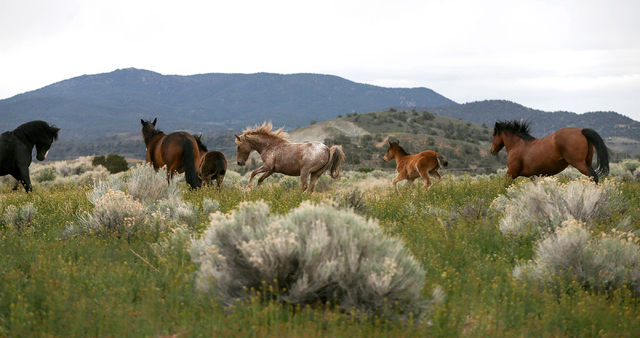Commentary: Resolving America’s wild horse crisis requires land reform
Earlier this month, a government-sponsored wild horse and burro advisory board issued a recommendation that the Bureau of Land Management sell or euthanize tens of thousands of wild horses being held in government corrals. The idea of a mass killing of horses was quickly — and predictably — met with fierce public condemnation.
For now, BLM officials have rejected the recommendation.
Even so, the advisory board’s position seemingly adds credence to the idea that America is in the midst of a wild horse crisis. One does not have to look very hard these days for a news story suggesting that horses are overrunning and damaging fragile public lands in the western United States.
In actuality, at most approximately 55,000 wild horses remain free on Western public lands. These horses are spread out over more than 30 million acres in 10 states. Moreover, this is just more than two and a half times the number of horses that existed when Congress passed the Free-Roaming Wild Horses and Burros Act in 1971 as a means to protect them from extinction, and is a far cry from the millions of horses that roamed the West in 1900.
What has changed for wild horses, as well as for all Western wildlife, is that over the past half-century or more America has increasingly commercialized Western public lands. Today, upwards of 2 million cattle graze public lands, and the government has authorized thousands of oil, gas and mineral extraction projects on federally owned properties. The result truly is a crisis. These commercial activities have substantially fragmented and reduced the amount of habitat left for wild animals.
Today, the BLM regularly limits wild horse herds to fewer than 200 animals, and intensely manages them in designated areas. The horses are provided only a small portion of the land once set aside for their protection, and many management areas have been closed to horses altogether to allow for more grazing and mining.
Other Western animals, including sage grouse, bison, prairie dogs, black-footed ferrets, bears and wolves, are similarly being pushed into tiny pockets of the landscape to make room for commercialization.
Underlying this crisis are fundamental flaws in the laws guiding federal public land management. For well more than a century, we have managed our public lands using a “multiple use” concept.
The idea, at least to those who created the concept in the early 20th century, was that our public lands are so vast and so resource-rich, that grazing, logging, mining, recreation and wildlife could co-exist. In reality, this system creates direct competition among commercial interests and wildlife for the supply of undeveloped, habitat-rich, public lands.
If Americans want to save Western wildlife, we have to change this unsustainable method of land use planning. Just as we don’t want our leaders to place parks, schools and housing in the middle of industrial sites, we need to separate commercial activities from wildlife habitats on public lands. Given the vast amount of Western lands, wild horses and other wildlife deserve open, unfragmented land to call home.
Yes, changing the status quo will hurt the pocketbooks of some commercial public lands users — and might initially burden an even larger number of Americans who use these lands for recreation. However, if we truly want to conserve wildlife in the West, there really are few options other than to admit that our current management approach is a failure.
Unless we make some drastic changes, and dedicate more public land for the exclusive use of wildlife, the wild horse “crisis” of today — where the government struggles to manage hundreds of fragmented herds — will be the new norm for all wildlife species, if they exist at all, in the near future.
Michael Ray Harris is the director of the wildlife law program for Friends of Animals, an international animal advocacy organization. He is based in Denver.



















